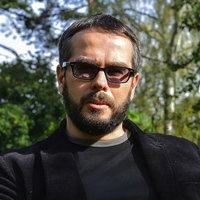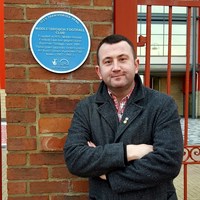
Rachelle Louise Barlow
I am currently working at Swansea University: http://www.swansea.ac.uk. For more information about research projects and I have been involved with and employment I have undertaken, please visit: <https://uk.linkedin.com/in/rachellebarlow>
Previous research:
2016 - AHRC Cultural Engagement Fellow (Postdoctoral Research Associate), School of Music, Cardiff University for the 'Commemorating WWI: Conflict and Creativity' research and engagement project.
2011-2015 - PhD in Ethnomusicology (passed viva in Sept 2015), School of Music, Cardiff University. Thesis: 'Land of Song: Gender and Identity in Welsh Choral Music, 1872-1918'.
2009-2010 - MA in Ethnomusicology (Distinction), School of Music, Cardiff University
- Dissertation: '"Land of My Fathers": Performing Masculinities in Welsh Choral Music'. This dissertation on gender and performance among choirs in South Wales, focussed on the expression of performed masculinities with respect to three distinctive ensembles - Kenfig Hill and District Male Voice Choir, South Wales Gay Men's Chorus and Serenity Female Voice Choir.
Supervisors: Supervised by Dr John Morgan O'Connell and examined by Professor Salwa El-Shawan Castelo-Branco (Universidade Nova de Lisboa; President of the International Council for Traditional Music) and Dr Sarah Hill (Cardiff University)
Previous research:
2016 - AHRC Cultural Engagement Fellow (Postdoctoral Research Associate), School of Music, Cardiff University for the 'Commemorating WWI: Conflict and Creativity' research and engagement project.
2011-2015 - PhD in Ethnomusicology (passed viva in Sept 2015), School of Music, Cardiff University. Thesis: 'Land of Song: Gender and Identity in Welsh Choral Music, 1872-1918'.
2009-2010 - MA in Ethnomusicology (Distinction), School of Music, Cardiff University
- Dissertation: '"Land of My Fathers": Performing Masculinities in Welsh Choral Music'. This dissertation on gender and performance among choirs in South Wales, focussed on the expression of performed masculinities with respect to three distinctive ensembles - Kenfig Hill and District Male Voice Choir, South Wales Gay Men's Chorus and Serenity Female Voice Choir.
Supervisors: Supervised by Dr John Morgan O'Connell and examined by Professor Salwa El-Shawan Castelo-Branco (Universidade Nova de Lisboa; President of the International Council for Traditional Music) and Dr Sarah Hill (Cardiff University)
less
Related Authors
Na'ama Pat-El
The University of Texas at Austin
Katherine Butler Schofield
King's College London
Benjamin Isakhan
Deakin University
Andrea Peto
Central European University
Dan Hicks
University of Oxford
Nicholas Evans
University of Aberdeen
Ruben López-Cano
Escola Superior de Música de Catalunya
Marek Tamm
Tallinn University
Tosh Warwick
The University of Sheffield
Egil Bakka
Norwegian University of Science and Technology
InterestsView All (27)









Uploads
Papers by Rachelle Louise Barlow
Music in Welsh Culture Before 1650: A Study of the Principal Sources. Sally Harper. 2007. Aldershot, UK: Ashgate Publishers. xix, 441 pp., figures, maps, music examples, tables, appendix, bibliography, indexes. Cloth, £70.00.
Conference Presentations by Rachelle Louise Barlow
Thesis by Rachelle Louise Barlow
Abstract:
This thesis concerns Wales as the ‘land of song’. In particular, it looks at choral singing in Wales which has long been considered a male tradition. From definitions of Welsh musical traditions featured in encyclopaedias to the continued use of male voice choirs at cultural events (such as rugby matches), men are continually promoted as the only bearers of the Welsh choral tradition. By contrast, this thesis questions such an assertion by arguing that women were also key players in its development in the late nineteenth and early twentieth centuries. In this matter, I interrogate two gendered stereotypes: Wales as ‘the land of my mothers’ (with reference to the suffrage movement) and Wales as ‘the land of my fathers’ (with reference to music, sport and nationhood). Conceived as a historical ethnography, this thesis draws upon extensive primary and secondary sources to provide the first in-depth study of gender and identity in Welsh choirs.
The core of the thesis is comprised of historical narratives of four case study choirs from the period under study, namely the South Wales Choral Union (led by ‘Caradog’), the Rhondda Glee Society (led by Tom Stephens) and the two Royal Welsh Ladies’ Choirs (led by Clara Novello Davies and Hannah Hughes-Thomas respectively). In each case, I provide a discussion of the choir’s origin and the social context in which it developed, details about performance practice, membership, social class, repertoire and each choir’s relationship to notions of gender and identity in Wales. Moreover, I present a new understanding of the choirs’ conductors through biographical accounts; information regarding Clara Novello Davies and Hannah Hughes-Thomas especially has not been featured in previous scholarly studies. Informed by my perspective as a Welsh woman, I present a nuanced reading of Wales as ‘the land of song’ by considering both historical narratives and personal ethnographic experiences today. In this manner, this thesis contributes to ethnomusicological literature on gendered discourse and concepts of nationhood.
Music in Welsh Culture Before 1650: A Study of the Principal Sources. Sally Harper. 2007. Aldershot, UK: Ashgate Publishers. xix, 441 pp., figures, maps, music examples, tables, appendix, bibliography, indexes. Cloth, £70.00.
Abstract:
This thesis concerns Wales as the ‘land of song’. In particular, it looks at choral singing in Wales which has long been considered a male tradition. From definitions of Welsh musical traditions featured in encyclopaedias to the continued use of male voice choirs at cultural events (such as rugby matches), men are continually promoted as the only bearers of the Welsh choral tradition. By contrast, this thesis questions such an assertion by arguing that women were also key players in its development in the late nineteenth and early twentieth centuries. In this matter, I interrogate two gendered stereotypes: Wales as ‘the land of my mothers’ (with reference to the suffrage movement) and Wales as ‘the land of my fathers’ (with reference to music, sport and nationhood). Conceived as a historical ethnography, this thesis draws upon extensive primary and secondary sources to provide the first in-depth study of gender and identity in Welsh choirs.
The core of the thesis is comprised of historical narratives of four case study choirs from the period under study, namely the South Wales Choral Union (led by ‘Caradog’), the Rhondda Glee Society (led by Tom Stephens) and the two Royal Welsh Ladies’ Choirs (led by Clara Novello Davies and Hannah Hughes-Thomas respectively). In each case, I provide a discussion of the choir’s origin and the social context in which it developed, details about performance practice, membership, social class, repertoire and each choir’s relationship to notions of gender and identity in Wales. Moreover, I present a new understanding of the choirs’ conductors through biographical accounts; information regarding Clara Novello Davies and Hannah Hughes-Thomas especially has not been featured in previous scholarly studies. Informed by my perspective as a Welsh woman, I present a nuanced reading of Wales as ‘the land of song’ by considering both historical narratives and personal ethnographic experiences today. In this manner, this thesis contributes to ethnomusicological literature on gendered discourse and concepts of nationhood.